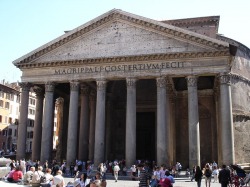RELiGiON.

Religion in Ancient Rome played a very important role in Ancient Rome and Romans. Roman religion centered on gods and even explanations for events usually involved the god in one way or another. They genarally worshipped the earth, sea, sun, sky, and other various elements of nature. Romans believed that gods controlled their lives so they spent a lot of time worshipping them because they believe that their gods had great influence over their daily lives and fate.
Roman religion is a lot like Greek religion in some ways, and other ways they differ. One thing they had in common was that the Romans and Greeks believed there were many gods, and that each controlling a different part of the world like: storms, ocean, marriage, etc. One thing they differ in was that the Romans were a lot more interested in power, and not a lot in balance like the Greeks.
After the ruling of Emperor Augustus [27 BC to AD 14], Emperor Augustus was also considered to be a god and was worshipped on special occasions. For every god they have a special festival day for them which was usually a public holiday. They holidays gave people a chance to visit the temple for the god that was being celebrated. At the temple, priests would sacrifice animals and give them to the god.
Every family's household would have a small altar and shrine. The Romans household would have a personal household gods or spirits called “lares” which were worshipped at home every day. Inside the shrine contained statues of the lares and the head of the household led family prayers around the shrine each day. That tradition was very important that even family slaves were invited.
Ancient Romans treat their emperors as living gods, or something very close to the gods, depending on who you asked. Mostly in the eastern part of the Roman Empire, in Egypt and western Asia, people worshipped the emperors as gods. On the other hand, people in the western part, in Europe, people only worshipped the emperors guardian angel, but not the emperor itself.
